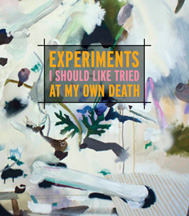What do you think?
Rate this book


78 pages, Paperback
First published January 1, 2012
Fad Mad, Fairchild, Fearmonger, Flashface.
from "Common Plant & Animal Names (Existing & Not Existing)"
The spoon
is too loud for the teacup The eye
is too large for the pane But look — look: the narrowing
effect of panic on rage A dreadful rumble
replacing the nothing
that you hear No You need
to pay greater
attention